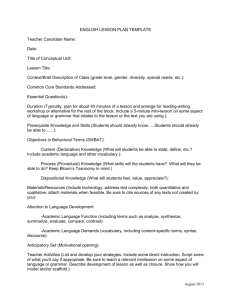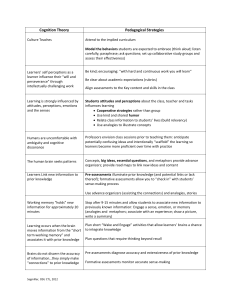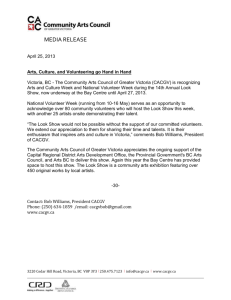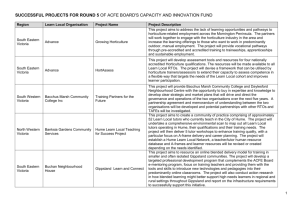Learning and Teaching Policy VPS
advertisement
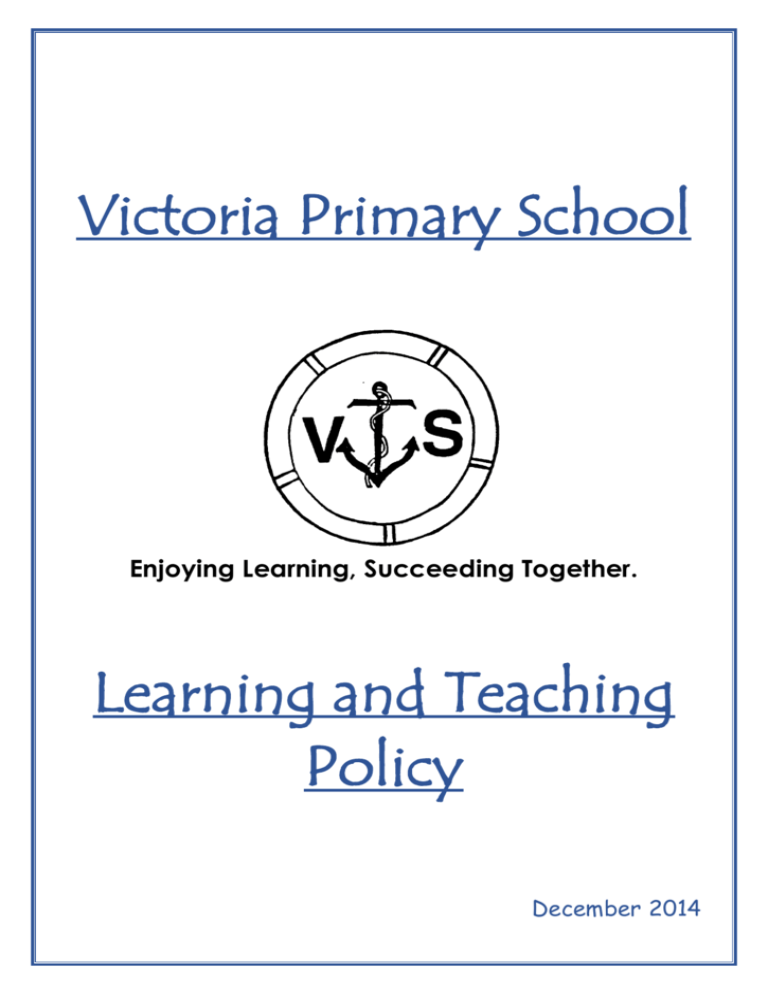
Victoria Primary School Enjoying Learning, Succeeding Together. Learning and Teaching Policy December 2014 Learning and Teaching At Victoria Primary School we value quality learning and teaching as part of the child’s entitlement to a coherent curriculum (Building the Curriculum 3: pg.14). We believe that children learn best where: • Teaching is fun, creative, differentiated and personalised to suit individual interests and needs. • Learning takes place in the four contexts for learning (Discrete Lessons, Interdisciplinary Learning, Ethos and Life of the School as a Community and Providing Opportunities for Personal Achievement) to ensure a broad learning experience. • The seven design principles of the curriculum are routinely incorporated into our teaching. Thus, children are provided with opportunities to gain knowledge, skills and attributes throughout their learning. • Adult input is provided where appropriate, this could be from the class teacher, PSA, SfL, parents or other outside agencies. • Lessons are varied with different teaching styles; as to suit all types of learners. • Lessons incorporate the four approaches to learning (Active Learning, Outdoor Learning, use of ICT and Collaborative Learning). • There are opportunities for independent, paired and collaborative tasks, as well as child initiated and led activities. • Lessons ensure coverage of the Experiences and Outcomes and incorporate teaching skills for life, learning and work. • Lessons are well-planned and thought out and there are opportunities for child initiated planning of topic and interdisciplinary themes. • Lessons are responsive to the needs and interests of learners. • There are opportunities to evaluate and reflect on the learning. • Children are encouraged to take risks and support the learning of others. Four Phase Lesson Model We have an expectation that teachers plan their lessons utilising the 4 phase lesson model: 1. An opportunity to review prior learning is an important aspect of each lesson. This provides the learners with time to consider previous lessons and to understand the learning to come. 2. The lesson is introduced through direct teaching where clear Learning Intentions and Success Criteria are presented by the teacher and where appropriate, created by the children. 3. Children are given a learning activity, which will vary in approach. This may be based on independent, paired or group work. Activities will also provide an opportunity to consolidate and apply new learning. 4. The lesson will conclude with a well-planned plenary. This allows the children to clarify and consolidate their learning. A plenary is essential for helping children embed knowledge and skills developed throughout the lessons. Assessment The Learning Environment We recognise the need for varied and continuous assessments of children’s learning in order to plan future learning experiences. At Victoria Primary School we believe that good classroom organisation and management is imperative in providing high quality Learning and Teaching experiences. In our classrooms we expect to see: In our school we: • Use prior knowledge and standardised assessments to inform our groupings. • Use the information gained during these assessments to target ‘priority learners’ • Use a range of formative assessment strategies during each lesson including: Effective Questioning; Peer and SelfAssessment; checking for understanding and timely feedback. • Consider assessment at the planning stage, using a range of activities (Make, Say, Write, Do) • Use summative assessments sensitively and effectively to gain a snap-shot of progress. • Report to parents/carers both formally once a term and informally throughout the year. • Gather a range of ‘latest and best’ evidence during Jotter Week. This information is used to moderate progress and inform future learning. • Take part in moderation tasks both within our school and across the cluster to ensure consistency of teacher judgement. • An engaging and stimulating environment which celebrates learning. • An environment that is organised and well-resourced to suit the needs of all children. • Classrooms which encourage learners to be independent and wellorganised. • High quality displays arranged to enable effective learning in different subject areas, which includes the use of floorbooks and learning walls. • The School’s positive behaviour policy evident within the classroom. (e.g. - Golden Time charts, Class Points etc.) • A physical layout that is appropriate for the class. E.g. Table groupings, carpet areas, clearly defined learning spaces and space to move around. • Teachers’ plans in an easily accessible place to allow for clear communication of plans between all adults and children. • Examples of children’s personal achievements. • Effective communication between Teachers, Pupils and Pupil Support Assistants. • Happy teachers and children! We strive to provide a fun and inspiring environment for learning, in which children are motivated and valued as individuals. Ethos and Relationships The success of our school results from the quality of the relationships that we have built between staff and pupils. At Victoria we feel proud of our ability to form and nurture positive relationships between children, teachers, support staff and parents/carers. We help maintain these relationships through: • Having clear and consistent expectations of children’s behaviour and attitudes, and through using exciting incentives and rewards for such behaviours. • Utilising positive reinforcement and praising children’s good behaviour and manners. • Treating all individuals with respect and encouraging this respect from the children. • Modelling positive behaviour for the children to see. • Providing opportunities for the children to develop self-confidence and selfrespect. • Teaching the children values in all that we do. • Encouraging positive relationships between the school and its members and the local community through school-run events. • Ensuring both staff and children are aware of their rights and responsibilities within the school. Career-Long Professional Learning All teachers and senior management are encouraged to utilise their CLPL and professional development time effectively. In Victoria Primary we understand that: • Keeping up to date with different curricular developments and advances is essential for effective practice. Professional development should always have a direct impact on practice and link clearly with the school’s Improvement Plan. • The Professional Review and Development process allows for a planned outline of future CLPL opportunities. • Learning is most effective when it is school wide, teachers are encouraged to share their learning within the school. Taking part in Learning Rounds both within and out-with our school provides an opportunity to share our professional practice and learn from that of others. • The Senior Leadership Team have a responsibility to monitor and evaluate the Learning and Teaching across the school. There will be various opportunities to meet and discuss this throughout the year (e.g. forward plan discussions, shared classroom experience, jotter week feedback and PR&Ds).
